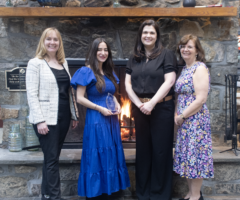"Summertime, and the livin’ is easy…" as Gershwin wrote, and true it is. No more school, after- school lessons, and no more homework. Kids feel free, parents breathe easier, life has a slower pace.
Perhaps fifty years ago, even twenty-five years ago, this was the life, but not now, not entirely. Yes, no school, no homework, but research has shown that students of all ages lose skills and knowledge when they spend two months without any intellectual challenge, without reading or simple calculation. What’s a parent to do?
As a speech-language pathologist, parents often ask me, "Can’t we just forget all the routine, take a break now?" Of course parents and children are tired from the long school year, the regimen, the homework, every hour during the week accounted for, and even on the weekends. It’s good for everyone to take a break from deadlines and tight schedules — that’s the purpose of vacation — and most people realize the benefits of taking a vacation for a week or two. Recharge the batteries, take time for relaxation, and perhaps in your child’s case, spend the day swimming or playing sports. But the two-month break is a long time, and for many children, a sacrifice of achievement in language and reading skills.
Can parents do anything to keep the momentum gained during the school year but still maintain the sense of a well-deserved break from the rigors of school? To my mind there are many leisure-time activities that promote language and reading literacy, opportunities to exercise these skills in ways that not only preserve but continue to build verbal and reading abilities.
For young children in the elementary grades, a half hour to hour of family reading time in the evening, after dinner and bath, can become a routine that carries over throughout the year. By family reading, I mean parents and children read, separately and to each other. Read and perhaps re-read aloud picture books, early readers or simple chapter books with parents and children reading sections. Or if the child is ready and willing, he or she can read independently while parents read their own books, magazines or the daily newspaper. And, very importantly, talk about what everyone is reading. In fact, the talking can begin at the dinner table, sharing the day’s events, even if the entire family doesn’t eat together, as is the case with many families these days.
Whenever children are given the opportunity to relate a story or an event that’s happened, and someone listens, asks questions, shows interest, a critical skill is exercised: the ability to translate an idea into words and communicate one’s thoughts. Through listening and speaking, children build vocabulary and learn more complex sentence structure. Sometimes it only takes daily conversation, talking about the day’s events. If you add reading time, you’re incorporating key lessons without going through the formal rubric of school and homework.
What about the older child, in middle school, for example? Your son or daughter might be glued to the computer screen every free minute during the school year, and now even more during the summer. Just as we have come to realize that television can be a valuable teaching tool if children are directed to the History Channel, the Discovery Channel, and public television, so too the internet can help your child’s language and reading skills. With guidance, children can find websites that give them information about something they like, whether it’s baseball or football, photography, fashion, a myriad of subjects. Most of these sites have opportunities for interaction, chat rooms or other possibilities that exercise writing skills. This is with supervision, however, so you, the parent, are not entirely freed from responsibility. But wouldn’t you rather have your child engaged in activities that promote literacy in ways that will naturally evolve into lifetime learning?
My own sons learned to read the daily newspaper by seeing us reading over breakfast every day. They began with the sports section, then moved to the front page as they advanced through school. When we stopped reading aloud to them toward the end of elementary school, they continued reading in bed on their own. When they asked questions we didn’t know the answers to, we went to the internet and researched the subject with them, until they started doing it themselves. All of these activities came out of their own natural inclinations, learning opportunities that can happen anytime, not just in school.
Can the summer be a carefree time for relaxing, as well as learning, for listening and sharing ideas, speaking and telling stories — the essential process of communication? Can you enrich your child’s skills during the long summer vacation without sacrificing freedom from the structure of the school year? It can be as simple as telling stories around the campfire, reading together at the picnic table, or sharing the day’s events in the long daylight hours before bed.
Gloria Lazar is a communications specialist with a private practice in Tarrytown. LazarSpeech@aol.com






